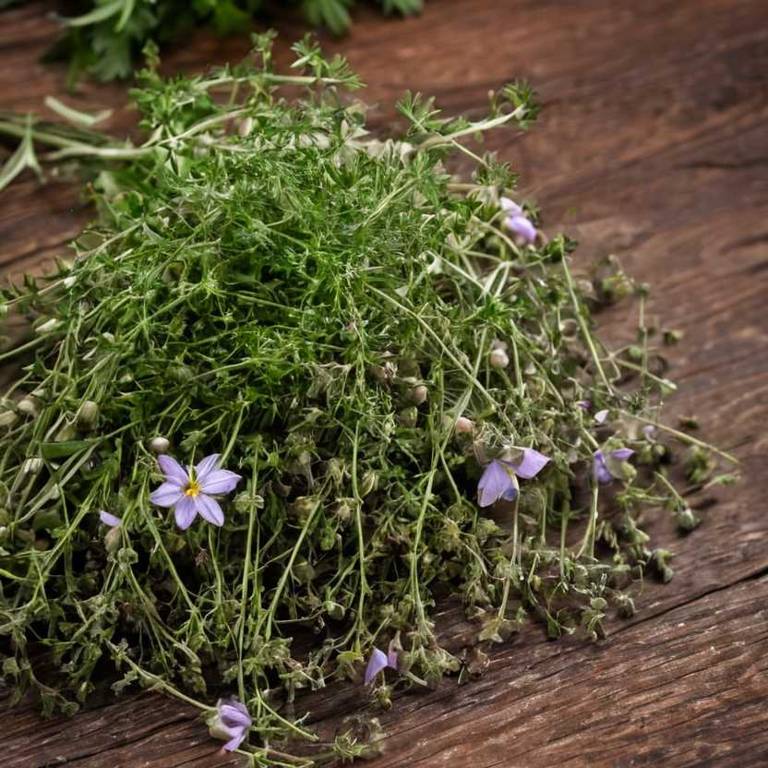10 Best Centaurium Erythraea Health Benefits

Centaurium erythraea, also known as red centaury, is a small herbaceous plant that has been traditionally used in herbal medicine for its potential health benefits.
It is believed to support digestive health by promoting the secretion of digestive enzymes and improving gut motility. The plant contains various bioactive compounds, including flavonoids and alkaloids, which may contribute to its antioxidant and anti-inflammatory properties. Some studies suggest that Centaurium erythraea may help in reducing symptoms of digestive disorders such as bloating and indigestion.
However, more research is needed to fully understand its therapeutic potential and confirm its efficacy in modern medicine.
1. Boosts digestion
Centaurium erythraea boosts digestion by supporting the healthy function of the gastrointestinal tract.
It contains compounds that may help stimulate the production of digestive enzymes, aiding in the breakdown of food and nutrient absorption. This herb is often used in traditional medicine to alleviate common digestive issues such as bloating and indigestion. Its natural properties can also help regulate bowel movements and promote a balanced gut environment.
Overall, Centaurium erythraea is a valuable herb for enhancing digestive health and comfort.
2. Reduces inflammation
Centaurium erythraea reduces inflammation by containing bioactive compounds that inhibit pro-inflammatory pathways in the body.
Studies have shown that its extracts may help alleviate symptoms associated with inflammatory conditions such as arthritis and skin irritations. The herb's anti-inflammatory properties are attributed to its high concentration of flavonoids and other phytochemicals. Regular use of Centaurium erythraea may support the body's natural ability to manage inflammation.
As a result, it is increasingly being explored as a complementary therapy in holistic health approaches.
3. Supports liver health
Centaurium erythraea supports liver health by promoting the detoxification processes within the liver.
This herb contains bioactive compounds that may help protect liver cells from damage caused by toxins and oxidative stress. It is believed to enhance the liver's ability to regenerate and maintain its functional efficiency. The traditional use of Centaurium erythraea in herbal medicine aligns with its modern scientific interest in hepatoprotective effects.
Overall, it offers a natural approach to supporting liver function and overall metabolic health.
4. Improves circulation
Centaurium erythraea improves circulation by promoting the dilation of blood vessels, which helps increase blood flow throughout the body.
This herb is traditionally used to support cardiovascular health and may help reduce the risk of circulatory disorders. Its active compounds are believed to enhance the function of the circulatory system by improving the delivery of oxygen and nutrients to tissues. As a result, it can alleviate symptoms such as fatigue and cold hands and feet.
Regular use of Centaurium erythraea may contribute to overall better vascular health and enhanced physical performance.
5. Enhances heart function
Centaurium erythraea enhances heart function by improving cardiac output and supporting efficient blood circulation.
This herb contains bioactive compounds that may help regulate heart rate and strengthen myocardial contractions. Its traditional use in herbal medicine is supported by modern research indicating its potential to reduce oxidative stress and inflammation in cardiovascular tissues. The plant's ability to promote better blood flow can aid in preventing conditions like hypertension and ischemia.
Overall, Centaurium erythraea is considered a valuable natural supplement for cardiovascular health.
6. Aids in detoxification
Centaurium erythraea aids in detoxification by supporting the body's natural processes to eliminate harmful substances.
This herb is believed to enhance liver function, which plays a crucial role in filtering toxins from the bloodstream. Its bioactive compounds may help stimulate the production of enzymes necessary for metabolic detoxification. Additionally, Centaurium erythraea may assist in reducing the accumulation of heavy metals and other toxins in the body.
As a result, it is often used in herbal remedies to promote overall cleansing and health.
7. Promotes skin health
Centaurium erythraea promotes skin health by supporting the body's natural ability to maintain a balanced and resilient skin barrier.
Its anti-inflammatory properties help reduce redness and irritation, making it beneficial for individuals with sensitive or acne-prone skin. The herb is also rich in antioxidants, which combat free radicals and may help prevent premature aging. Additionally, Centaurium erythraea may enhance circulation, contributing to a healthier, more radiant complexion.
Overall, it offers a natural approach to improving skin condition and overall skin vitality.
8. Strengthens immune system
Centaurium erythraea strengthens immune system by stimulating the production of white blood cells, which are essential for fighting off infections and diseases.
This herb contains bioactive compounds such as flavonoids and iridoids that have anti-inflammatory and antioxidant properties, supporting overall immune function. Regular consumption of Centaurium erythraea may enhance the body's ability to resist pathogens and recover from illnesses more effectively. It is often used in traditional medicine to promote resilience against colds, flu, and other common ailments.
Its immune-boosting effects make it a valuable natural remedy for maintaining health and wellness.
9. May reduce stress
Centaurium erythraea may reduce stress by modulating the body's response to psychological and physiological stressors.
It contains bioactive compounds that may influence the central nervous system, promoting a calming effect. Studies suggest that it can help lower cortisol levels, which are often elevated during stressful situations. This herb is traditionally used in herbal medicine for its adaptogenic properties, which support the body's ability to manage stress.
Incorporating Centaurium erythraea into a wellness routine may offer a natural way to enhance resilience against stress.
10. Improves mood
Centaurium erythraea improves mood by influencing neurotransmitter activity in the brain, particularly serotonin and dopamine, which are essential for emotional well-being.
This herb has been traditionally used in herbal medicine to alleviate symptoms of depression and anxiety, promoting a more balanced emotional state. Its mild sedative and calming effects contribute to reducing stress and enhancing overall mental clarity. Studies suggest that Centaurium erythraea may help regulate mood swings and support emotional resilience.
As a natural remedy, it offers a gentle yet effective option for those seeking to enhance their psychological well-being.